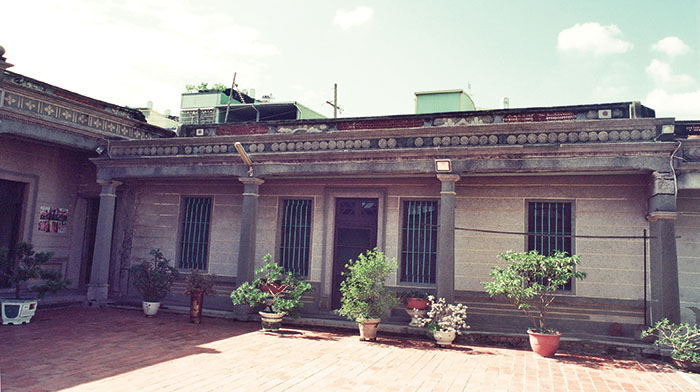The Wu Family Ancestral Homestead/大寮區潮寮與吳家古厝
The Wu Family Ancestral Homestead
◎English translation: Peng Hsin-yi
◎Photo by Jhou Shu-jheng
The Wu Family Ancestral Homestead is located on Jiankang Street. In order to get to it, one must drive down Jianye Road, through Dafa Industrial Park and then make a right on to Heti Road. It is located in the neighborhood on the right hand side of the Chaoliao Community. The homestead is a traditional single level home with an eye-catching, landscape mural on its back wall. It can also be identified by a wooden tablet hanging on the garden entrance with "Wu Family Ancestral Homestead" carved in traditional Chinese characters on it.
Wu Family Ancestral Homestead is typical of Minnan architecture that originated in Southern Fujian Province, China. The property actually consists of two three-section compounds, which were built side by side. This was because in 1936, the Wu family decided to separate their households. The oldest son, Wu Fa-ming then moved into the front compound, with his younger brother Wu Gong, the family's third son, living in the back. This reflects Chinese family tradition, where living quarters are determined by age and subsequent seniority. The two brothers built the two compounds themselves and gave the living quarters a unique design. These included a mosaic on the roof, decorative installations along the eaves trough and delicate carvings along the wooden windows.
The two brothers were also of different faiths and therefore the designs of their compounds reflected this. The older brother was Taoist, whereas the third brother was Christian. In Wu Gong's home hanging from a beam in the main hall was a wooden slab, carved with the phrase "God is Kindness, God is Love". There were also Christian couplets hanging on both sides of the door and a poster depicting the origins of Christianity.
In 2010, the Wu Family Ancestral Homestead was remodeled and became part of a cultural park that was opened to the public. The movie Wonderful Wedding featuring famous Taiwanese comedian Sie You-jhen, aka "Jhu Ge Liang" was also shot there. Many movie posters and memorabilia have been hung inside the homestead. The movie certainly brought great honor to the neighborhood.
Another ancestral homestead that was pointed out by some local elders was A-Cai's home which was located a few alleyways away. Other elders however, thought it couldn't be considered an ancestral homestead as A-Cai's home wasn't even 60 years old. A rather colorful, loud but friendly debate ensued. The neighborhood really seemed to reflect the street names Jiankang (Healthy) Street and Happy Road. People clearly interacted in happy and healthy ways. The Wu and A-Cai families must have certainly grown up in a wonderful neighborhood, surrounded by people that were kind, interesting and seemed to enjoy prosperous lives.
大寮區潮寮與吳家古厝
◎文、攝影/周書正
這次要去的潮寮以及有八十多年歷史的吳家古厝,就藏在大寮區大發工業區的背後,大寮區的東南角。開過貫穿大發工業區的建業路再右轉河堤路,右手邊一整片的低矮透天厝便是潮寮的主要聚落。
我從「快樂街」彎進聚落,在「健康街」找到古厝,「健康快樂」這個路名既直接又質樸的期許讓我莞爾。吳家古厝就坐落在健康街上,建築背面大片彩繪的原野與山景十分顯眼,彩繪的一端便是掛著「吳家古厝」木匾的園區後門。
吳家古厝是二進落式的閩南傳統建築,若是從空中鳥瞰,會發現吳家古厝是兩座三合院首尾相連組合起來的。1936年,吳家因為家族繁盛決議分家,大房吳法明及三房吳拱便在這裡蓋起了兩房共同的家;大房住在前落、三房則住在後落,代表長幼有序。據吳家耆老說,當時前後兩落分別交給一對師徒施作,徒弟為了與師父互別苗頭,於是在許多地方做了與師父不同的設計。從屋脊上拼貼圖案的設計、屋簷邊角的裝飾,到木窗框的花紋,只要花些時間細看都能感受到兩位匠人各自的風格與巧思。
 除了建築細節上的差異,大房與三房家族在宗教信仰上也南轅北轍。大房以台灣傳統道教信仰為主,走進埕內便能在廳堂裡看見香爐香案;三房則是信仰基督教,除了正廳寫著「上帝仁愛」四個大字的古樸匾額外,牆上、門上對聯都是與基督有關的話語,還在門邊的告示上說明了家族與改信基督教的緣起。
除了建築細節上的差異,大房與三房家族在宗教信仰上也南轅北轍。大房以台灣傳統道教信仰為主,走進埕內便能在廳堂裡看見香爐香案;三房則是信仰基督教,除了正廳寫著「上帝仁愛」四個大字的古樸匾額外,牆上、門上對聯都是與基督有關的話語,還在門邊的告示上說明了家族與改信基督教的緣起。
在2010年的改建後,吳家古厝便以文化園區的形式開放給外界。只要遊客不過分侵擾,吳家人都很歡迎你到這裡走走看看。在2015年春節,豬哥亮主演的電影《大囍臨門》便是以這裡做為主場景,古厝內也隨處可見與電影有關的劇照或是解說牌,可以窺見拍攝當時潮寮周遭的熱鬧與盛況。
由於天氣實在太熱,回程時我先跑去隔壁巷子裡的柑仔店買了罐加鹽沙士。柑仔店的老闆娘是個大腹便便的年輕女孩,看起來不過二十歲左右,店內就像是個小型的超市,除了常見的生活用品之外,還多了許多東南亞商品。而我之外的顧客就是幾位身穿淺藍色工作服的外籍移工,一位移工用手指了指自己胸前口袋裡的菸盒、再指一指櫃台後面的菸櫃;小媽媽熟練地抽出兩包七星,結完帳,兩人半開玩笑地用各自的腔調互道:「Thank you」。
我微笑著看他們語言不通卻彼此相熟的互動,但等我扭開瓶蓋走回車旁的時候,那裡卻聚集了幾位爺爺奶奶。
「啊,在那邊啦!」
「是天氣太熱,跑去買涼的啦。」
原來拿著相機四處抓拍的我早就引起了他們的討論,覺得好奇又新鮮的他們正圍在車旁議論紛紛。我向他們表明來意,說自己正為了手邊的文章走訪幾座古厝。其中一位阿嬤熱心的說隔幾條巷子的阿財家也是老厝,建議我過去看看。但另外幾位有不同的意見,他們認為阿財家頂多六十年,稱不上老厝。於是幾位長輩爭論了起來,充滿元氣、滄桑的嗓音叫醒了整條午睡中的健康街 。
我看著他們比手畫腳、聽著他們你來我往,腦海中想起了剛剛沿路經過的「快樂」與「健康」。潮寮與吳家古厝在他們的生活裡好好地詮釋了這兩個詞,快樂健康,大囍臨門。